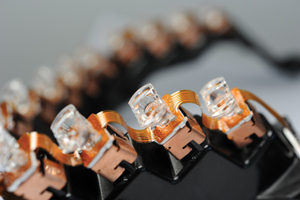

Advance PWBs Gain Traction in New Growth Fields
T
echnological advancement of printed wiring boards (PWBs) in emerging fields has been significant of late. Flexible printed circuits (FPCs) are thin, lightweight, bendable and stretchable, and can be freely designed. Their applications have expanded rapidly, encompassing smartphones and automobiles, and manufacturers have taken advantage of these trends.

Photo 1: Applications of FPCs expand
(FPCs for on-board LED lamps from Nippon Mektron, Ltd.)
With rigid PWBs, the development of millimeter wave radar PWBs and camera module PWBs in the advanced technology regions in automobiles, such as advanced driver assistance systems (ADAS), has become robust. In the smartphone and high-functional module fields, high-density technologies, including components-embedded PWBs, have been advancing.
Expand Applications
FPCs have emerged in various fields. Their applications range from being substitute for connectors and cables to high-density circuit boards in smartphones and other electronic devices. Functional markets of FPCs, such as sensors, have also been expanding in a broad range of fields, including automobiles, medical and healthcare, robot, and Internet of Things (IoT).
Among mainstream technologies in terms of high-density packaging required in fields such as smartphones include ultrafine FPCs with minimum pitch of 25μm for single-sided FPCs and minimum pitch of 30μm for double-sided FPCs using the roll-to-roll method; high-density multilayer FPCs that have achieved a total thickness of 0.4mm or smaller in a six-layer build-up structure; and ultrathin double-sided FPCs with a thickness of 34μm for the single-sided wiring section, and a thickness of 66μm for the double-sided wiring section.
When it comes to application of FPCs for sensors, stretchable FPCs that can be stretched in all directions, and expandable FPCs made by adding expandability to excellent properties of polyimide can be used as vital signs sensors. In addition, bend-detecting FPCs, which detect bending with no power supply, have also been developed.

 English
English Japanese
Japanese